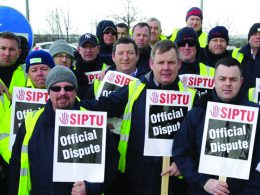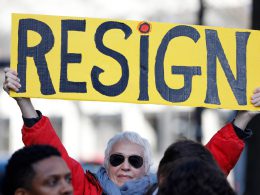The local and European elections in Northern Ireland has shown a deep disillusionment with the main parties and what constitutes politics. For most people, the elections had very little to do with their own lives and they took very little interest. This was reflected in turnout which was lower than the last elections in 2011. But hidden in the overall figure was an increase in turnout in Protestant areas, where hundreds of thousands voted to punish the DUP.
Hardline gains in unionism
Even though the DUP remains the largest unionist party, these elections saw the party challenged by Jim Allister of TUV and Henry Reilly of UKIP who between them won over 100,000 votes – a significant hardline vote which will cause concern for the DUP. In the local elections, the DUP saw their vote fall 4.1%, losing 15 council seats, including four in Belfast where the DUP has come under pressure since the union flag controversy.
The legacy of the flag controversy at Belfast City Hall has led to a strengthening of forces to the right of the DUP such as the TUV who won their first seat in Belfast and the resurrection of the PUP whose political obituary had been drafted by many previous to the flags protests. The PUP, led by former MLA Billy Hutchinson, succeeded in tapping into a deep anger against the DUP in many working class Protestant areas, not by attacking the DUP on a class basis but on a clear sectarian basis. In 2011 the PUP won a total of 1,493 votes across the North. In Court ward alone, Billy Hutchinson topped the poll with 1,647 votes. In total the PUP received 12,753 votes (7,096 in Belfast), winning 4 seats, coming close to taking several more. Likewise, the TUV made significant gains in the local elections, growing from 3 seats to 10 and capturing 9% of the unionist vote. The UUP managed to slightly increase their vote by 1% and gained 11 seats. The anti-DUP sentiment assisted the UUP but they have moved to a more hardline position too.
“Independent” dissidents make gains
Sinn Fein topped the poll in the European elections with 25% first preferences, taking advantage of the split in unionism. The much expected electoral breakthrough in the South helped Sinn Fein to argue that their “strategy” of becoming a major player in politics in the South and the North was working. Leaving aside the completely unreal assessment that by being in government both in the North and South somehow Sinn Fein will bring about a united Ireland, they will use their historic rise in the South to counter criticisms of their role in Stormont. Sinn Fein though were not immune to a growing anger in Catholic working class areas. They lost 10 seats in councils with their share of the vote marginally dropping by 0.7%. Significantly they lost a seat in their heartland of West Belfast where People Before Profit and Eirgi got significant results. In Derry & Strabane, a number of independents got elected in Catholic areas.
Gary Donnelly of 32 County Sovereignty Movement (linked to the Real IRA) stood as an independent in the Moor ward and topped the poll with 1154 votes. Donnelly is one of the most prominent dissident republican spokespersons who is publicly seen as a voice for republicans involved in armed attacks on the state. In other areas, dissident republican candidates closely connected with active paramilitary campaigns got a low vote but Donnelly’s vote is a real wake-up call to Sinn Fein who will be forced to tone down their attacks “micro-groups” in future.
The SDLP’s results show a further decline in the party’s fortunes, especially in Derry where they had managed to defend as a stronghold, until now. The SDLP are now in danger of losing their two Westminster seats in South Down and Derry. Speculation that Fianna Fail may contest future elections in the North to challenge Sinn Fein nationally won’t be welcome news for the SDLP.
New party needed to represent working class
These elections follow a period of increased sectarianism in the North. The rise of hardline unionists and to a lesser degree of dissident republicans reflects a rise in sectarianism and reaction in both communities. But this is not a true reflection of the aspirations of the majority of people. Large swathes of ordinary people did not vote in these elections. A significant section of workers and young people have absolutely no time for the reactionary nature of the main parties and their sectarian agendas.
The election of Gerry Carroll (People Before Profit) in West Belfast is a positive development in that it shows that it is possible to challenge the main sectarian blocs. Carroll’s previous Assembly and Westminster results showed that he was in with a credible shot of winning a seat. He was also helped by a lack of sectarian competition between nationalist and unionist parties. The so-called peace process left in the hands of sectarian politicians cannot bring about a stable, peaceful society. The danger signs of hardline parties gaining just magnifies the need for a new mass party of the working class which unites communities to fight for a better future for all.












